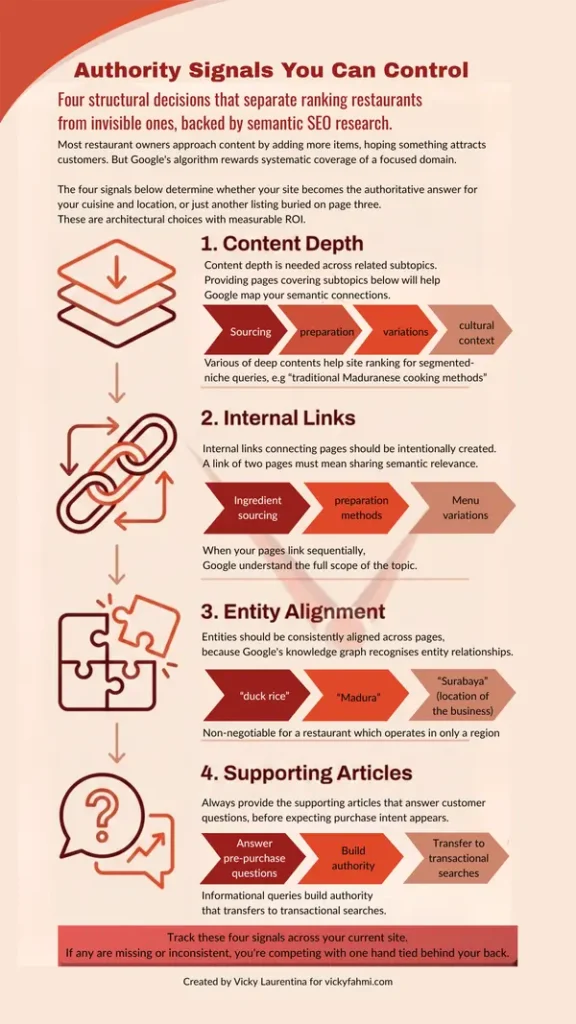A business site made to be seen organically triple times in five months simply by reorganising its content architecture around semantic relationships, or you can call it creating topical authority. In the context of a restaurant website, building topical authority means structuring content around a cuisine, a location, and a connected search ecosystem to enable people to associate your site with verifiable expertise.
Is this about publishing more articles, or even chasing keywords? No, it’s about reorganising what you already have and what you publish next, so every page reinforces the same expertise signal. When you’ve done it correctly, your content can be seen more frequently without posting too much more content or spending too much on ads.
Authority Signals in a Restaurant Website
Topical authority of your website can be seen through content which is consistent, connected, and semantically aligned across the website. A lot of research shows a clear pattern that sites with strong authority signals rank for hundreds of related queries they never explicitly targeted. While sites with scattered content struggle to rank, even their primary menu items.
There are some authority signals that we can control, which I synthesised from a Koray Gubur‘s article.
Most restaurants fail here. They publish random food photos, generic pages of “about us”, and menu PDFs. Men, are you really sure that the search engine can extract authority from those efforts?
A Practical Authority Building Framework
Building topical authority for a website requires a structured approach that goes beyond publishing more content. This framework can consistently produce results within 120 days or 180 days when executed properly. This is an execution pattern refined through many audits of websites competing in crowded local markets.
Below is the framework that I do.
How to build topical authority for a restaurant website
- Define the core topic.
Your authority anchor should be a pair of single cuisine-location, not “restaurant” or “[nationality type] food”.
For a Maduranese duck rice restaurant in Surabaya, the core topic is “Maduranese duck rice in Surabaya”, which becomes your semantic centre. Everything you publish should connect directly to the core, such as “duck preparation techniques”. Or, connect contextually, such as “Surabaya food culture” or “Maduranese cooking traditions”. - Map supporting subtopics.
A content cluster which is connected, is formed by menu items, preparation methods, sourcing stories, and cultural relevance.
I map these using entity relationships, not arbitrary categories.
For a cluster of duck rice, subtopics can include duck breeds used in traditional recipes, spice blends of Maduranese and their origins, rice varieties and cooking methods, and the historical context of duck rice in Madura.
Each subtopic should have dedicated content that reinforces adjacent subtopics. - Connect pages intentionally.
Use conditional logic for internal linking. If a page explains ingredients, it must link to preparation and menu pages. When a page discusses cultural history, it should link to traditional recipes and variations of the modern menu.
This is about creating semantic pathways that mirror how people think, which machines can parse reliably. - Publish with semantic death.
Expertise signals compounds through terminology that is repeated, appropriately used, and aligned.
When you consistently use “bebek Madura”, “bumbu kuning”, and “sambel pencit” across pages with proper context, Google can build confidence in your topical boundaries. This happens through natural language processing.
This is exactly the point where strategy usually collapses, because execution loses discipline. Most businesses generally break because they rush.
My client used to publish 20 thin pages a month, then wondered why rankings stalled. Actually, it lacked internal logic and continuity. Haven’t you seen a lot of other businesses fail on the point, too?
How to Measure Topical Authority
Topical authority can’t be measured through a single score, but it can be evaluated by analysing a combination of content quality, topical coverage, internal linking, and user engagement over time (Manick Bhan, 2025)
So, in the context of a restaurant website, signals of topical authority can be seen in the growth of impressions for cuisine-specific, non-branded queries.
Try to track queries that sounded like “authentic Maduranese duck preparation” or “traditional duck rice Surabaya” in Search Console. When these impressions rise while you actually didn’t target them explicitly, your semantic signals are basically working.
(Check your own data now, do you already have this data and just aren’t looking at it this way?)
You can confirm that Google sees connections when crawl frequency increases across the pages which are semantically related. If Google crawls your page of ingredient sourcing more frequently after you publish a page of preparation methods, then your structure of internal linking must have functioned correctly.
Meanwhile, if multiple related questions appear in your Search Console queries, they indicate the breadth of the topic. You should start ranking for “what makes Maduranese duck different”, “how to cook duck rice traditionally”, and “best duck rice in Surabaya” simultaneously. But this is likely to happen when your content network has covered the full scope of the topic.
Besides influencing rankings, these same signals also determine whether your content is eligible for extraction by AI-driven search systems. Yes, SEO has evolved from a problem of traffic optimisation into a problem of eligibility to be seen.
Topical Signals That AI Systems Trust
I’ve watched now that ChatGPT, Perplexity, and Google AI Overview, answer millions of restaurant queries daily. It seems that obsessing over Google rankings is no longer enough. And the restaurants that have succeeded in appearing in AI-generated answers are simply making their expertise machine-readable.
Watch this table to understand how to build topical authority for AI-generated answers, and weak or noisy execution that fails a website for AI-generated answers. AI systems extract answers from content that shows clear topical boundaries, stable entity relationships, and procedural clarity.
| Signal Type | AI-Trusted Execution | Weak/Noisy Execution |
| Topical Boundary Clarity | Each page operates within a topical boundary that clearly defined, such as Maduranese duck rice in Surabaya, with no semantic drift outside that scope. | Content loosely discusses “food”, “restaurants”, or “local dining” without a clearly defined scope. Pages overlap unrelated cuisines or locations. |
| Entity Consistency | Core entities (e.g bebek Madura, Surabaya) are used consistently, contextually, and repeatedly across related pages. | Entities like dish names, locations, and cultural terms, are used inconsistently or interchangeably, confusing machine interpretation. |
| Complete Answer Resolution | Each page fully resolves a specific question, covering definition, differentiation, context, and implications in a place. | Pages introduce a topic in three paragraphs, but stop short of fully answering the implied question, leaving readers or systems to infer the missing context. |
| Semantic Connectivity | Internal links form semantic pathways that mirror logical thinking. Such as form sourcing, continue to preparation, then end with menu. | Pages exist in isolation or are linked arbitrarily for navigation rather than meaning. |
| Procedural Clarity | Explanations follow a clear, ordered logic that machines can parse as process, comparison, or criteria. | Internal links form semantic pathways that mirror logical thinking. Such as form sourcing, continue to preparation, then end with the menu. |
| Noise Control | Content volume is restrained, intentional, and aligned, reinforcing the same topical signals without contradiction. | Redundant pages, thin posts, or loosely related content dilute topical focus. |
| Signals of Attribution and Authority | The content reflects practitioner-led insight, strategic judgment, and first-hand evaluation, strengthening EEAT signals. | No clear author perspective, experience, or accountability is visible. |
I’ve rescued multiple business content projects where well-intentioned staff had published dozens of pages that introduced semantic noise, ultimately diluting topical authority. Fixing this problem requires someone who understands both how machines extract answers and how humans actually search and decide.
As a content strategist, I help improve attribution clarity, prevent misaligned execution, and strengthen authority signals for both search engines and AI-generated answers. This is why collaborating with a content strategist helps improve your topical authority. What about yourself, has your team optimised for user intent, or are you just wandering around an algorithm problem?
Businesses that will dominate AI-generated answers are already thinking about this. They’re building the most comprehensive, accurate, and useful knowledge resource in their specific domain.
Vicky Laurentina, 2025
That’s what AI systems reward, and that’s what searchers trust. When you connect all of these pieces, the conclusion is unavoidable. Authority is built deliberately, or it doesn’t build at all.
Start Building Authority That Actually Works
Most restaurants experiment with content, publish inconsistently, then wonder why organic traffic stays flat. The gap is that their content’s structure can’t be detected by search engines and AI systems, so these machines can’t interpret those restaurants as expertise.
Do you want to know whether your current site is building authority or just creating semantic noise? You can evaluate it by inspecting gaps in topic coverage, the logic of internal links, entity consistency, crawl behaviour, and patterns of query expansion. Those signals already exist in your data; you just need someone who knows how to read them.
Review how a content strategist approaches this problem end-to-end, without forcing a rebuild or chasing short-term tactics.
(Because debugging a system is cheaper than replacing it.)
This content was published on October 2nd, 2025, but updated on January 21st, 2026, to give the latest insights.



Berasa rumit sekali membangun otoritas topik. Tapi, emang sih. Kalau kita ingin brand kita dikenal nggak hanya di offline, tapi di online juga, kudu mau belajar tentang membangun otoritas topik sih.
Sebetulnya yang benar itu namanya “topical authority” ya, Yuni, belum cocok sih untuk diterjemahkan jadi “otoritas topik”.
Meskipun topical authority ini terdengar rumit untuk orang yang baru pertama kali membangun brand-nya, tapi akan lebih mudah kalau membangun authority ini seperti jadi nyonya rumah sebuah pesta. Semakin sering kita nongol dengan konten kabar yang segar, semakin lekat para tamu pesta (alias pengunjung) itu akan mengingat kita dengan perasaan yang unik juga. Dan keunikan itu yang akan membangun topical authority kita.
Memang fokus pada 1 niche itu penting banget ya dalam dunia blog gini biar authoritynya terbentuk. PR banget nih buatku mbak biar bisa bikin blog dengan niche khusus
Iya, karena sekali kita menguasai suatu niche, maka baik pembaca maupun Google akan mempercayai ke-expert-an kita. Tantangannya yang sungguhan adalah memperdalam isi blog supaya menjadi tempat tujuan orang yang ingin mencari konten dengan topik itu.
Melalui artikel Ka Vicky, aku jadi membuka kembali pelajaran mengenai topical authority yang sebenernya pemahamannya tuh adalah sub dari tema utama tulisan kita, gitu yaa, ka Vick..
Dengan pemahaman kita yang mendalam terhadap sebuah niche atau topik tertentu, maka mesin pencari google pun akan semakin mendeteksi sebagai expert di bidang tersebut.
Tapi kalau untuk pemilik usaha kuliner, misalnyaa.. kini ada google yang terdapat kolom komentar.
Dan komentar ini aku rasa lebih jujur daripada apapun.
“Google yang terdapat kolom komentar” mungkin maksudnya Google Business Profile untuk para usaha kuliner ya..
Aku setuju bahwa kolom komentar itu semacam suara kejujuran bagi usaha bisnis yang terdapat di Google. Komentar itu tempat para konsumen mengekspresikan pikiran mereka lebih cepat daripada laporan SEO manapun.
Maka aku menganggap komentar-komentar itu bisa jadi sumber data yang berharga banget. Setiap komentar itu pada dasarnya adalah insight tentang keyword yang relevan bagi usaha terkait, yang menunjukkan apa yang betul-betul dipedulikan orang.